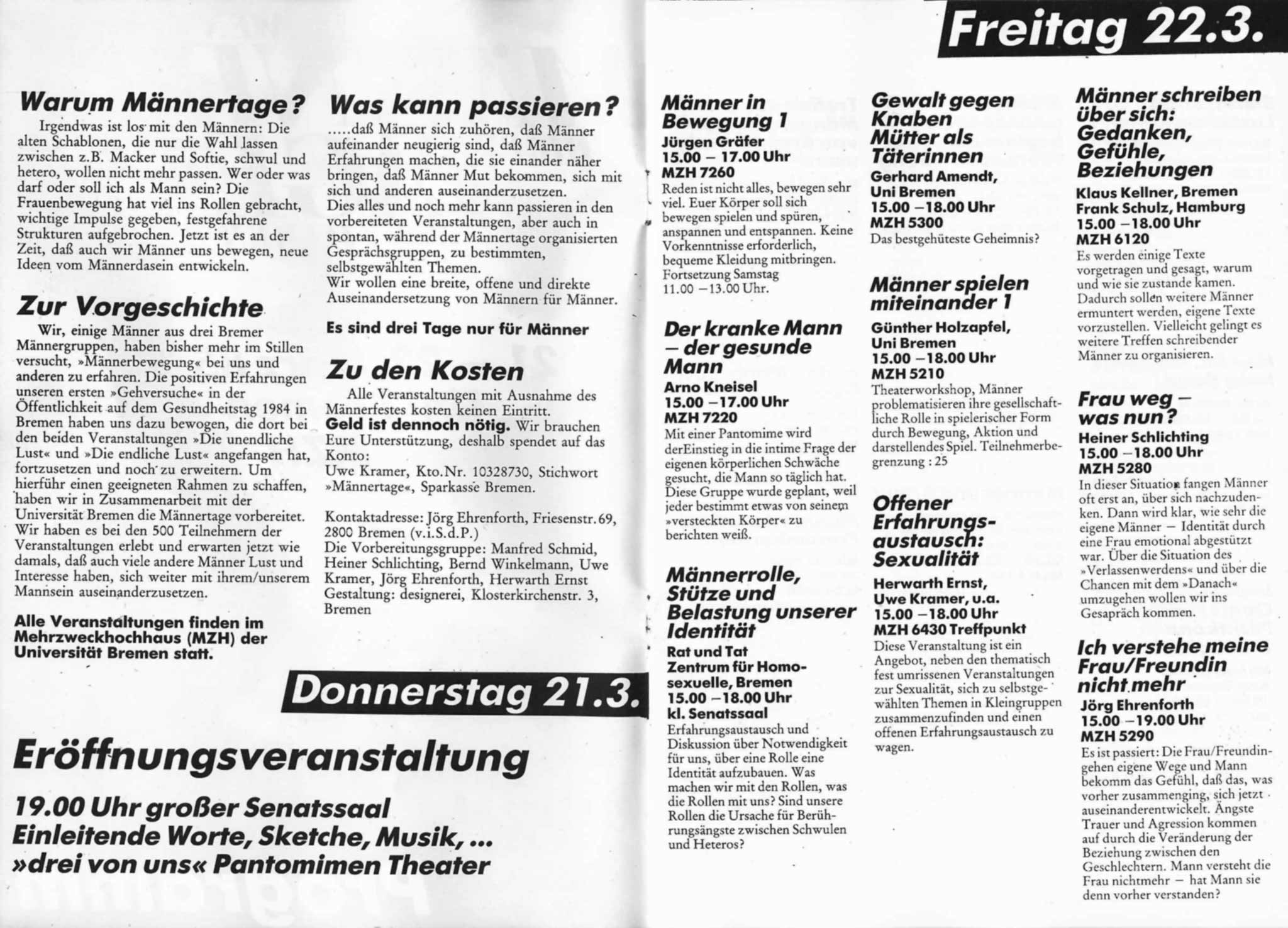
Back Then: “That Time of the Month for Men”
In 1985, the first ever Bremen Men’s Days took place at the university
From March 21 to 23, 1985, the MZH of the University of Bremen transformed into a man’s world when the “Bremer Männertage” (Bremen Men’s Days) were held there under the motto: “That time of the month for men.” The idea for the event stemmed from the third nationwide Health Day which had also been held at the University of Bremen in 1984. The “nur für Männer” events (“For men only”) unexpectedly proved to be extremely popular.
The preparation group consisted of representatives of various men’s groups in Bremen and included psychologist Jorge Ehrenforth and carpenter Herwarth Ernst, who both later also published the conference transcript and men’s book “Gegenstimmen.”
The “New Man” at the Center
The initiators summed up their motives for holding the event in a flyer, which the Verdener Allerzeitung newspaper quoted on March 6, 1985: “The women’s movement set the ball rolling in many respects, provided important impulses and shook up entrenched situations. Now the time has come for us men to also bring about change and develop new ideas of what it means to be a man.” Meanwhile, on March 14, 1985, the Nordsee-Zeitung newspaperwrote that many men are tired of “having to live up to a role which is forced on them and of functioning only the eternally strong ones.” The event therefore wanted to focus on the “new man” – freed of old-established gender clichés which could only be found in the black and white domain of the “tough bloke” or the “softy” or were somewhere between homo and heterosexuality.
No part of the event was ever open to women. This was not, however, be viewed as an affront to women, nor as a tit-for-tat response to the “Bremen Women’s Week”, which had been open only to women but, instead, only represented the wish “to, for once, have an unrestricted forum.” (Delmenhorster Kreisblatt newspaper of March 14, 1985).
Time for Discussions
The Men’s Days offered plenty of opportunity for discussions on various topics such as “men in women’s professions” or “federal army men,” male sexuality in general, homosexuality as well as relationship problems. Disputes with parents were also discussed, particularly with a view to an understanding of the role of the men’s own fathers who found the search for a “new male identity” more alien than anything else.
Alongside the debates, there were also plenty of interactive participation opportunities, such as theatre performances by men for men, a percussion workshop, as well as relaxation exercises under the motto “Men in motion.”
Critics: “Woolen Sock-Wearing Wimps”
As expected, there was also criticism in the run-up to the event. Wherever gender identities are being radically stirred up, you will, of course, also have “traditionalists” and “reformers” clashing with one another. An article in the ZEIT newspaper of March 29, 1985, wrote that many “established men” who had no interest in questioning their understanding of their role, rejected the event from the start. They scornfully declared that only the “woolen sock-wearing wimps who don’t get on with women […]” would take part in it. Some businesses in Bremen even banned any publicizing of the event which had the potential to “disturb the peace in the business.”
Despite this, the event organizers were still able to celebrate their event being a success. With around 1,000 visitors per day, the response was much greater than had been anticipated. The Bremen Men’s Days enjoyed a crowning finale on the Saturday evening with a “men only party” at the Hochschule für Technik college.
Contact:
Contact Jörg Ehrenforth for more information about the “Bremen Men’s Days”: ehrenforth@uni-bremen.de